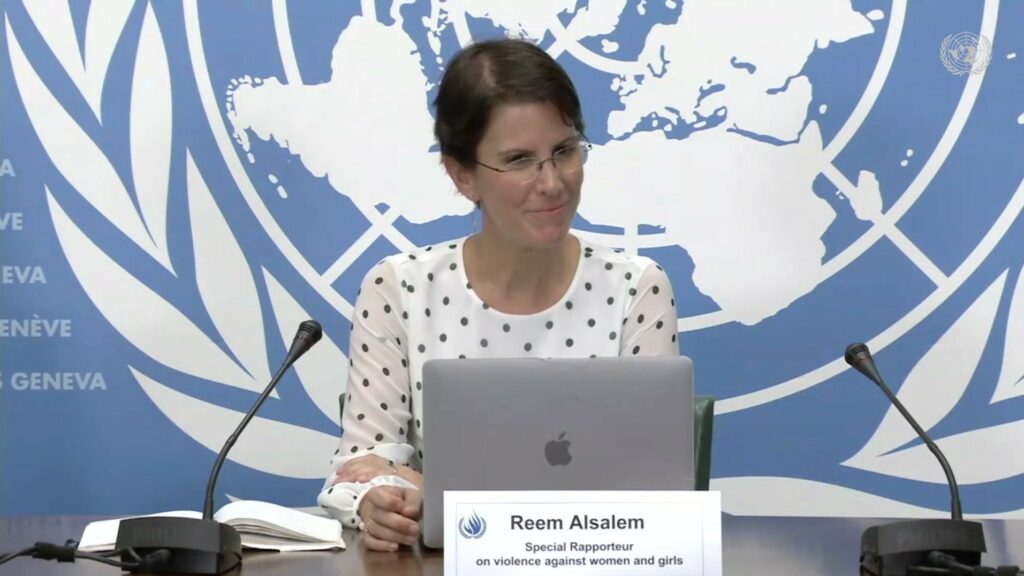Pornography
UN official calls for the abolition of the porn industry
It is rare for anyone associated with the United Nations to take a stance against any aspect of the Sexual Revolution, and thus a recent report by Reem Alsalem, the U.N. special rapporteur on the causes and consequences of violence against girls stating that prostitution “reduces women and girls to mere commodities” and “hinders their ability to achieve true equality” is very encouraging. Indeed, as C-Fam reported on June 27, Alsalem also called “for countries to abolish pornography and criminalize its possession and production.”
Alsalem is right to make the connection between pornography and prostitution, both of which are sexual exploitation industries. In my 2016 book The Culture War, I noted that while pornography dehumanizes women for a mass audience and drives a growing addiction to sexual violence, human trafficking and prostitution allow men to play out their ugly fantasies in real life. When I interviewed anti-sex trafficking activist and then-Member of Parliament Joy Smith on the issue, she told me that pimps use mainstream porn to groom their victims into accepting sexual assault.
Additionally, Smith noted that in studies, huge numbers of them report using prostitution so that they can do things that they would never try on “real women.” The resulting pregnancies, of course, can be dealt with by abortionists since the unborn are not, in the eyes of our culture, “real children.”
These are all just different aspects of commodity culture – which is why pro-abortion organizations such as the U.N.’s Women Deliver and the International Planned Parenthood Federation strongly criticized Alsalem’s report, with IPPF stating: “We denounce in the strongest terms the content of this report and the ideologically driven process that led to it. There is no feminism without sex workers.”
To her great credit, Alsalem rejects the term “sex worker” completely, noting in her report that the term “wrongly depicts prostitution as an activity as worthy and dignified as other work,” instead referring to “victims” and “prostituted women and girls.” In her report, Alsalem advocates the “Nordic model” – this is the model in Canada – where “prostituted persons themselves are decriminalized, but buyers of sex acts and pimps face penalties.” She also affirmed the link between prostitution and pornography and called for a raft of anti-porn policies.
In advocating for the abolition of porn, Alsalem adds her voice to a growing international consensus that pornography is poisoning our society and that age verification, restrictions, and (as the French prosecutor general recently suggested) prosecution are necessary to respond to the overwhelming ubiquity of sexually violent content. Alsalem rightly referred to pornography as a “form of prostitution”; the National Center on Sexual Exploitation praised the “astonishing clarity” of the “groundbreaking” report. C-Fam noted that Alsalem also “emphasized the importance of support services to help women and girls exit prostitution including ‘single-sex spaces.’”
For those who think that banning porn is possible, consider the fact that it has already been done. In 2018, the Daily Mail reported that Nepal had “implemented a sweeping ban on all forms of pornography in its latest efforts to tackle the country’s rape problem” – the rate had risen 300 percent in a decade – with a statement by Nepal’s Ministry for Information and Communication citing “pornography as one of the primary drivers behind the country’s rape problem.” The Nepalese Criminal Code now prohibits “the production and dissemination of sexually obscene content… to prevent the access of such content through electronic media… pulling down such websites inside Nepal has become necessary.”
In country after country, pornography is being pinpointed as a devastating and destructive cultural poison – and not only by Christians, but by the secular elites. Reem Alsalem is not, as C-Fam pointed out, a social conservative. I find that encouraging. It means that the damage caused by pornography is so clear that not even progressives can ignore it any longer.









Jonathan I believe you need to read further. Read article 14.
https://www.undocs.org/Home/Mobile?FinalSymbol=A%2FAC.291%2FL.15&Language=E&DeviceType=Desktop&LangRequested=False